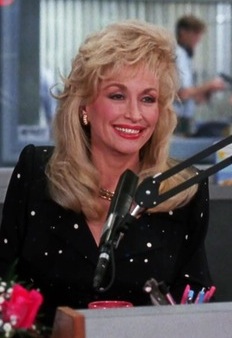Monday, April 6, 1992.
STRAIGHT TALK. Written by Craig Bolotin and Patrick Resnick. Music by Brad Fiedel, with songs by Dolly Parton. Directed by Barnet Kellman. Running time: 91minutes. Rated Mature with the B.C. Classifier's warning: "occasional coarse language."
SPRING HAS SPRUNG. WITH love in the air, filmgoers in the mood for a sassy, song-filled romantic comedy could do a lot worse than Straight Talk.
A cheerful earful from Murphy Brown producer-director Barnet Kellman, it twits investigative reporters, open-line broadcasters and Chicago-style deep dish pizza. Would you believe Dolly Parton and James Woods as the lovers?
The last time that Woods played a reporter, he was working for the intense Oliver Stone. In 1986's Salvador, Woods gave one of his typically manic, explosively driven performances as he ferreted out the truth about U.S. military involvement in Central America.
The last time we saw Parton, she was gossiping with the girls in Steel Magnolias (1989). As the owner of Turvy's Beauty Spot in Chinquapin Parish, Louisiana, she gave one of her typically effervescent, down-home performances.
Straight Talk gives Woods the chance to calm down, lighten up and play a nice guy. As Sun-Times staff writer Jack Russell, he's merely workaholic.
Early one morning, he spots attractive Shirlee Kenyon (Parton) on the wrong side of a Wacker Drive bridge railing. He thinks she's attempting suicide and rushes to save her.
She thinks she's chasing her last $20 bill. With his "help," she nearly falls into the Chicago River.
Imagine Russell's surprise when Kenyon later turns up as "Dr. Shirlee," radio station WNDY's on-air personal advice columnist. As her celebrity increases, his suspicions deepen.
He's right, of course.
Director Kellman opens his film with the very non-U Kenyon walking out on her Flat River, Arkansas boyfriend and heading for the big city in search of better things.
Following her encounter with Russell, she's hired as a telephone receptionist at WNDY. Kenyon is taking a coffee break when radio producer Tony DeSantos (Charles Fleischer) hustles her into his studio.
He's mistaken her for the station's new hot-liner.
When she turns out to be a natural, a deception is born. When she becomes a local phenomenon, honesty-advocate Russell takes on the job of exposing her.
If Woods is a lot looser than usual, Parton remains the Dolly we've come to know and love. The Tennessee-born country and western star knows what works and sticks with it.
The all-American country girl, she combines rural sentimentality with direct, earthy innocence to create a character no red-blooded urban cowboy could possibly resist.
She also contributes a selection of songs that underscore the story's various moods. With actors Griffin Dunne, John Sayles, Spalding Grey, Jerry Orbach and Philip Bosco providing professional timing in the supporting roles, a happy ending is assured.
The above is a restored version of a Province review by Michael Walsh originally published in 1992. For additional information on this archived material, please visit my FAQ.
Afterword: The age of social media began with the words "'Mr. Watson. Come here. I want to see you." They were spoken on March 10, 1876 by Alexander Graham Bell, the Scottish-Canadian inventor of the telephone, to his research assistant Thomas Watson in the test that proved that speech could be transmitted telegraphically. One thing led to another, and by the turn of the 20th Century, everybody wanted one. Around this time, an Italian inventor added the notion of "wireless telegraphy" to the mix. Guglielmo Marconi's bright idea evolved into the radio and, in 1932, a New York broadcaster named Lester Kroll took the next step. Using the pseudonym "John J. Anthony," Kroll launched The Goodwill Hour, the first talk show to take listener telephone calls and provide life counselling. Seventy years on, Dolly Parton played a Kroll-like character, dispensing uncredentialed advice to her Chicagoland listeners in Straight Talk.
The digital communications that inspired the Mashable website to create Social Media Day in 2010 are relatively new. The World Wide Web was in the process of being born in 1992, the year that Straight Talk celebrated the sillier side of hot-line radio. Facebook was launched in 2004, and Scots blogger Pete Cashmore created Mashable in 2005. Twitter entered the picture in 2006, and the first generation iPhone went on sale in 2007. A decade later, it seems as if these Internet innovations have reshaped the world. Don't worry, though. As Canadian Prime Minister Justin Trudeau's father told us in 1972, "the universe is unfolding as it should."
